8 start with P start with P
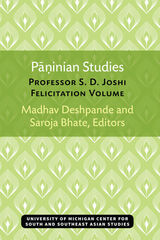

E-Textbooks are now available to purchase or rent through VitalSource.com! Please visit VitalSource for more information on pricing and availability.
As of January 1, 2021, Smart Sparrow Companion Websites are no longer available for any of our textbook programs. New companion websites are coming soon, and will be hosted by Lingco. Instructors may sample the new companion websites now by visiting GUPTextbooks.com/companionwebsites. The full websites will be available for fall 2021 course adoption.
Until the new companion websites become available, eBook Workbooks with exercises from the Smart Sparrow Electronic Workbook are available for purchase on the GUP website and VitalSource.com, as are Workbook Answer Keys. They will both be sold in eBook format only.
Panorama moves intermediate-level students of Russian toward advanced proficiency by engaging them in a systematic and comprehensive approach to Russian grammar with texts from a variety of genres, including proverbs and sayings to immerse students in Russian culture.
By reading and listening to Russian literary classics and contemporary nonfiction texts, students develop a contextual understanding of Russian culture and forms of expression that grow their command of vocabulary, grammar, and complex syntax. The textbook includes comprehensive in-class vocabulary and grammar exercises and discussion topics as well as reading texts (for work in class and at home), summative oral and written exercises, and compelling color photos.
An additional eBook Workbook (sold separately) includes essential homework exercises to practice vocabulary, grammar, listening, and speaking. eBook Workbook Answer Keys are also available for purchase for instructor use, or for students to check their own work.
Features of Panorama:
• Content can be used in one semester/two terms or for a full year• Modular structure allows instructors flexibility to assign chapters in their own sequence• Authentic photojournalist photos to prompt discussion exercises for each chapter topic• Summative exercises for each chapter test student mastery of the grammar topics, vocabulary, and cultural competence related to the chapter theme in a written essay format• Most grammar examples and exercises are drawn from the Russian National Corpus• Readings include blogs, blog comments, articles, and interviews, exposing students to current Russian culture and language. • Audio needed for completing homework exercises is available for free at www.press.georgetown.edu
For Teachers:
Exam copies of the textbook, Workbook, and Workbook Answer Keys are available free of charge to instructors and must be requested separately. Textbook exam copies can be ordered on this page. To request digital exam copies of the Workbook and Workbook Answer Keys, please visit the pages for each of those products, or visit VitalSource.com.
A free online Teachers Manual is also available and features supplementary activities and texts, including ideas for group activities, research projects, songs and video clips for each chapter, audio files of native speakers reading the literary classics from each chapter, and guidance to create a syllabus and exam, with a sample syllabus and sample chapter test. Available at www.press.georgetown.edu.
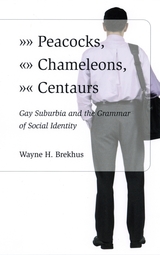
In this first-ever ethnography of American gay suburbanites, Wayne H. Brekhus demonstrates that who one is depends at least in part on where and when one is. For many urban gay men, being homosexual is key to their identity because they live, work, and socialize in almost exclusively gay circles. Brekhus calls such men "lifestylers" or peacocks. Chameleons or "commuters," on the other hand, live and work in conventional suburban settings, but lead intense gay social and sexual lives outside the suburbs. Centaurs, meanwhile, or "integrators," mix typical suburban jobs and homes with low-key gay social and sexual activities. In other words, lifestylers see homosexuality as something you are, commuters as something you do, and integrators as part of yourself.
Ultimately, Brekhus shows that lifestyling, commuting, and integrating embody competing identity strategies that occur not only among gay men but across a broad range of social categories. What results, then, is an innovative work that will interest sociologists, psychologists, anthropologists, and students of gay culture.
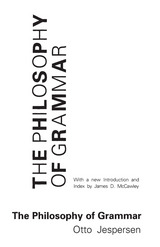
University in 1909-10, called “An Introduction to English Grammar.”
It is the connected presentation of Jespersen's views of the general
principles of grammar based on years of studying various languages
through both direct observation of living speech and written and
printed documents.
“[The Philosophy of Grammar and Analytic Syntax] set
forth the most extensive and original theory of universal grammar
prior to the work of Chomsky and other generative grammarians of the
last thirty years.”—Arne Juul and Hans F. Nielsen, in Otto
Jespersen: Facets of His Life and Work
“Besides being one of the most perceptive observers and original
thinkers that the field of linguistics has ever known, Jespersen was
also one of its most entertaining writers, and reading The
Philosophy of Grammar is fun. Read it, enjoy it.”—James D.
McCawley, from the Introduction
Otto Jespersen (1860-1943), an authority on the growth and structure
of language, was the Chair of the English Department at the University
of Copenhagen. Among his many works are A Modern English
Grammar and Analytic Syntax, the latter published by the
University of Chicago Press.
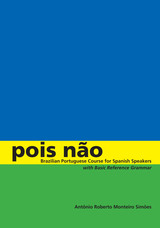
Spanish speakers can learn Brazilian Portuguese much more rapidly than any other language, and thousands of students have used Antônio Simões's text/workbook Com licença: Brazilian Portuguese for Spanish Speakers to make the transition between the two languages. Recognizing the need for a text that incorporates current cultural references and the latest language pedagogy, Simões now offers Pois não: Brazilian Portuguese Course for Spanish Speakers, with Basic Reference Grammar.
Pois não contrasts Portuguese and Spanish, which accomplishes two main goals. It teaches the equivalent of one year of college Portuguese in one semester, three times a week, to Spanish speakers who also have a solid understanding of English. Additionally, the book serves as a basic reference guide to Brazilian Portuguese for the same audience.
Pois não can be used by students in the classroom or by independent learners. Users of the book may focus on the drills alone, concentrate on both the explanations and drills, or use the book as a reference for consultation only. Answers to all of the exercises are included in the book. Audio and video recordings by native Brazilian speakers of dialogues that appear in the book can be downloaded at https://utexas.box.com/v/PoisNaoAudio.
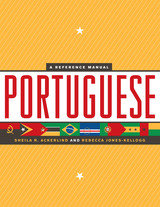
An essential, comprehensive guide for all who are interested in learning the Portuguese language and mastering its complexities, Portuguese: A Reference Manual supplements the phonetic and grammatical explanations offered in basic textbooks. While the Manual focuses on Brazilian Portuguese, it incorporates European Portuguese variants and thus provides a more complete description of the language. Accessible to non-linguists and novice language learners, as well as informative for instructors of Portuguese and specialists in other languages, this guide incorporates the Orthographic Accord (in effect since 2009–2010), which attempts to standardize Portuguese orthography.
The Manual reflects the language as it is currently taught at both the undergraduate and graduate levels by providing detailed explanations of the sound and writing systems and the grammar of the principal Portuguese dialects. A reference guide rather than a textbook, the Manual also provides extensive verb charts, as well as comparisons of Portuguese with English and Spanish.
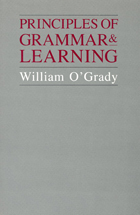
To support this thesis, O'Grady develops a well-articulated, single level, categorial-type grammar that he uses to analyze syntactic categories, extraction, anaphora, extraposition, and quantifier placement in English and other languages. He shows that such grammars can be constructed via general learning strategies from notions such as dependency, adjacency, precedence, and continuity, and that the available acquisition data points to the emergence of the principles he proposes.
While exploratory, this book provides one of the few serious attempts to develop a theory of grammar and learning that does not posit faculty-specific innate principles. Principles of Grammar and Learning is an exemplary attempt to bring together issues and data from syntactic theory, language acquisition, and the more general study of the human mind.
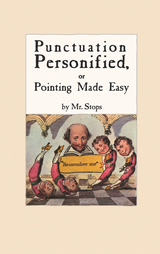
A series of larger-than-life characters in the book, including Mr. Stops, Counsellor Comma, and the hero, Young Robert, humorously bring its lessons to life with witty and amusing verse such as: "See, how Semicolon is strutting with pride; Into two or more parts he'll a sentence divide." Lively and colorful engravings, meanwhile, infuse the book with an entertaining spirit, while also reinforcing the lessons laid out in its cheerful rhymes.
It is evident to see how a child would have enjoyed learning about grammar through Punctuation Personified, as its simple but instructive verse and vibrant illustrations skillfully open up a fresh world of knowledge. This new edition, featuring a modern introduction, will delight and amuse readers of all ages.
READERS
Browse our collection.
PUBLISHERS
See BiblioVault's publisher services.
STUDENT SERVICES
Files for college accessibility offices.
UChicago Accessibility Resources
home | accessibility | search | about | contact us
BiblioVault ® 2001 - 2024
The University of Chicago Press









